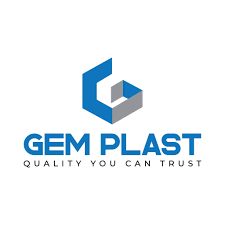Rate Analysis for Gypsum Plaster: A Complete Guide in 2025
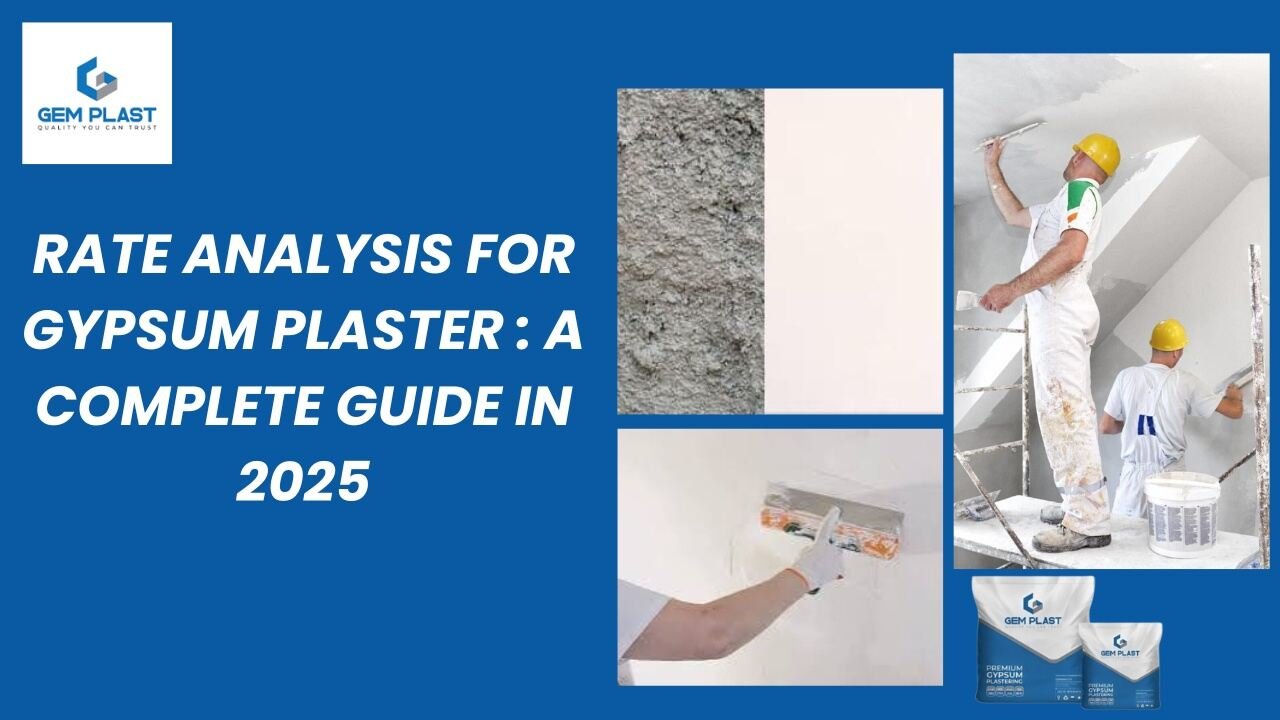
As a contractor, estimator, or homeowner intending to remodel part of the house, familiarising yourself with the rate analysis for gypsum plaster will aid you in cost estimating and cost control. Particularly with modern construction, gypsum plaster is becoming increasingly popular because it achieves a smooth finish, has a quick application, and very little curing time is needed. In this article, we will look at how rates are formulated, what elements impact pricing, and how to maximise your return on value. This doesn’t matter if you’re a builder, an architect or a homeowner; this guide will make the budgeting process regarding gypsum plaster straightforward.
What is gypsum Plaster?
Gypsum plaster is one type of plaster that derives from the mineral gypsum, which is composed of CaSO₄2H₂O(calcium sulfate dihydrate). It develops into a paste that, when mixed with water, sets fast and solidifies. Owing to its application and smooth texture, gypsum plaster is mainly used in building and construction, particularly for the finishing of walls and ceilings.
Benefits of gypsum plaster
Main benefits of gypsum plaster:
1. No curing Time Required
Compared to cement plaster, gypsum plaster is more efficient and cost-friendly because it does not need water curing.
2. Quick Setting
The construction progress is accelerated because gypsum plaster sets faster than other materials, within 24 to 72 hours, depending on the external factors.
3. Lightweight and Easy to Apply
Gypsum plaster is more lightweight than traditional cement plaster and therefore, is easier to transport as well as apply. This ultimately lowers the overall dead weight of the construction.
3. Smooth Finish, Ideal for Painting
Gypsum plaster’s smooth finish is optimal for both painting and any additional finishing work.
4. Fire-resistant and Sound-Insulating
Due to the water molecules contained within the structure of gypsum, it becomes sound-insulating. Exposed to heat, it releases this water, which helps contain the fire and slows down the heat transfer.
5. Eco-friendly
In comparison to other forms of plaster, which are based on cement, gypsum plaster is eco-friendly as it is made from natural materials and has a reduced impact on the environment.
Components of Rate Analysis for Gypsum Plaster
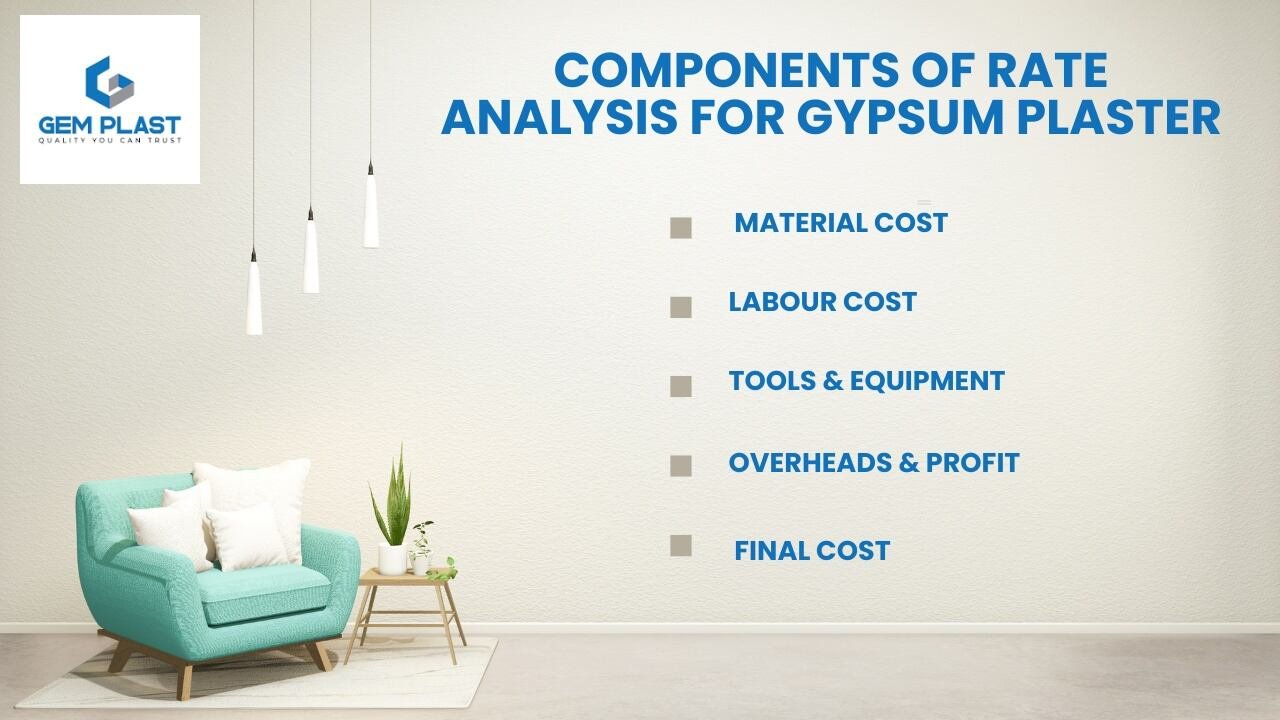
A detailed rate analysis for gypsum plaster in India as of 2025, incorporating current material and labour costs, overheads, and profit margins.
Material Cost
- Gypsum Powder: Main component, available in bags (usually 25 kg or 40 kg).
- Admixtures or Binders: Optional, depending on manufacturer specs.
- Water: Clean water for mixing.
Example Material Consumption:
1 square meter of 12 mm-thick gypsum plaster requires approximately 9-11 kg. One 25 kg bag covers roughly 100 square feet at 12mm thickness
Price per bag: ₹ 250 (exclusive of GST).
For 100 square feet: Four bags at ₹250 each equal ₹1,000.
Add 5% for wastage: ₹1000 multiplied by 5% = ₹50.
Total Material Cost: ₹1,050
Transportation, Tools & Tackles:
- Assumed at 5% of material cost: ₹1,050 × 5% = ₹52.50.
Safety Measures:
- Assumed at 1% of material cost: ₹1,050 × 1% = ₹10.50.
Subtotal (Materials + Overheads): ₹1,050 + ₹52.50 + ₹10.50 = ₹1,113
Labour Cost
Labour charges vary by region and complexity, but on average:
- Skilled mason: ₹500–₹800 per day
- Helper: ₹300–₹400 per day
Assuming one mason and one helper can plaster 10–15 sq m. per day, labour cost per sq m will be:
Estimated Labour Cost:
Mason:
- One mason can plaster approximately 100 sq ft in 8 hours.
- Rate: ₹800 per day
Helper:
- Assisting the mason.
- Rate: ₹400 per day.
Scaffolding:
- Assumed at ₹20 per square meter.
- For 100 sq ft (≈9.29 sq m): ₹20 × 9.29 = ₹185.80.
Total Labour Cost: ₹800 (mason) + ₹400 (helper) + ₹185.80 (scaffolding) = ₹1,385.80.
Tools & Equipment
- Plastering trowel, hawk, mixing tools, ladders/scaffolding (if ceiling work involved)
- These are typically included in overheads or depreciated over multiple jobs.
- Estimated cost:
Materials + Labour: ₹1,113 + ₹1,385.80 = ₹2,498.80.
Overheads & Profit
This includes:
Site setup, supervision, wastage (~5%), and the contractor’s margin
Add-on: ₹15–₹25 per sq.m.
Assumed at 15%: ₹2,498.80 × 15% = ₹374.82
Final Cost
- Total Cost: ₹2,498.80 + ₹374.82 = ₹2,873.62.
- Per Square Foot Rate: ₹2,873.62 ÷ 100 sq ft = ₹28.74
- Per Square Meter Rate: ₹28.74 × 10.764 = ₹309.20.
Additional Costs
Water & Electricity: 2% of material and labour costs
Final Rate Analysis Summary (Per Sq M)
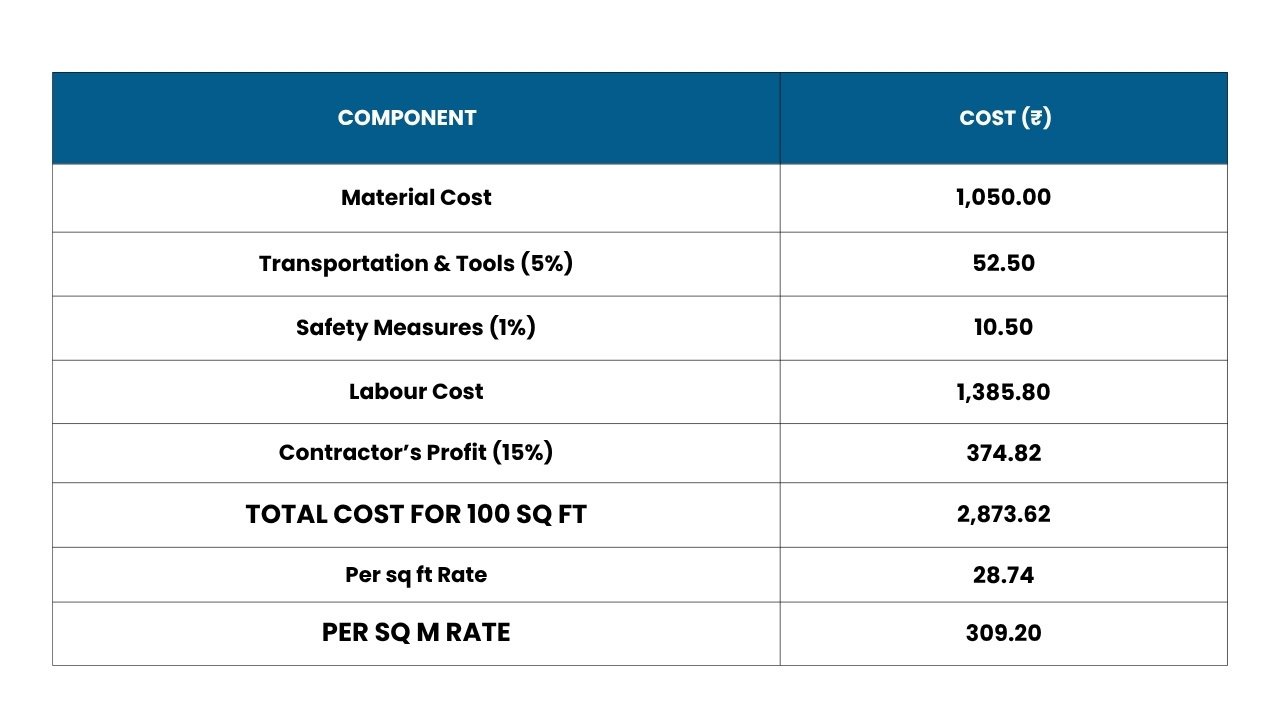
Total Material Cost: ₹1,050
Transportation, Tools & Tackles:
Assumed at 5% of material cost: ₹1,050 × 5% = ₹52.50.
Safety Measures:
- Assumed at 1% of material cost: ₹1,050 × 1% = ₹10.50.
- Subtotal (Materials + Overheads): ₹1,050 + ₹52.50 + ₹10.50 = ₹1,113
- Labour cost:
- Skilled mason: ₹500–₹800 per day
- Helper: ₹300–₹400 per day
Total Labour Cost: ₹800 (mason) + ₹400 (helper) + ₹185.80 (scaffolding) = ₹1,385.80.Materials + Labour: ₹1,113 + ₹1,385.80 = ₹2,498.80. - Add-on: ₹15–₹25 per sq.m.
- Assumed at 15%: ₹2,498.80 × 15% = ₹374.82
- Total Cost: ₹2,498.80 + ₹374.82 = ₹2,873.62.
- Per Square Foot Rate: ₹2,873.62 ÷ 100 sq ft = ₹28.74
- Per Square Meter Rate: ₹28.74 × 10.764 = ₹309.20.
Tips for Cost-Effective Gypsum Plastering
-
Buy in Bulk
For purchasing certain materials, purchasing in bulk will reduce the costs due to discounts available and the lower transport prices. This is especially beneficial when a project is medium to large because it ensures an uninterrupted supply, along with various other benefits. The best aspect of having plaster in bulk is the buying price and minimising delivery delays, not to mention easier negotiations with suppliers. Nevertheless, the plaster must be stored in dry places, thus avoiding moisture damage.
-
Use Experienced Labour
An efficient plaster applicator ensures that mixing, thickness, and pipework are completed quickly and cost-effectively. They not only help with productivity, but the quality of the outcome is remarkable. On the other hand, a lack of experience results in uneven surfaces, and the cost goes up due to having to do rework. Being experienced helps save and neatly finish materials used, resulting in reduced and better material loss.
-
Check Surface Preparation
Gypseous plaster requires the base to be cleaned because it firmly grips clean, dry wall surfaces. A clean and smooth surface helps to save plaster, while the chances of cracks forming later are reduced significantly. Poor surface preparation leads to poorly executed project costs, which is an inefficient way to manage resources.
-
Analyse Different Brands
Some brands, such as Saint-Gobain Gyproc or USG Boral, offer premixed versions that can save on labour and application time. Not all gypsum plasters are created equal. Some are better than others in terms of coverage, smoothness, and shrinkage. Analyse the market before choosing. While evaluating Gemplast, comparing it with some of its competitors helps select a brand with a greater value per bag, thus reducing material use and time.
Cost Comparison: Gypsum Plaster vs Other Plastering Methods

Cost effectiveness is a concern when it comes to plaster selection for your project. Let us look at the average costs per square foot as well as the advantages of Gypsum Plaster over other plastering techniques:
Gypsum Plaster (₹830–₹913)
Gypsum plaster provides an economical, paint-ready surface that is fast to install, making it an effective choice for interior construction projects. Requiring no curing time means reduced project completion time. Perfectly suitable for use on walls and ceilings in residential and commercial properties alike to cut costs down significantly.
Cement Plaster (₹913–₹996)
It’s more labour-intensive due to its curing and finishing requirements, but remains an affordable option for general plastering needs.
Venetian Plaster (₹830–₹2,075)
It’s suitable for creating beautiful textures but comes with a premium price and requires skilled labour.
Acoustic Plaster (₹1,079–₹1,162)
Acoustic plaster offers sound insulation properties. It’s more expensive but delivers modern acoustic solutions.
Tadelakt Plaster (₹1,245–₹1,328)
Tadelakt is a water-resistant and decorative Moroccan-style plaster, but it is more expensive.
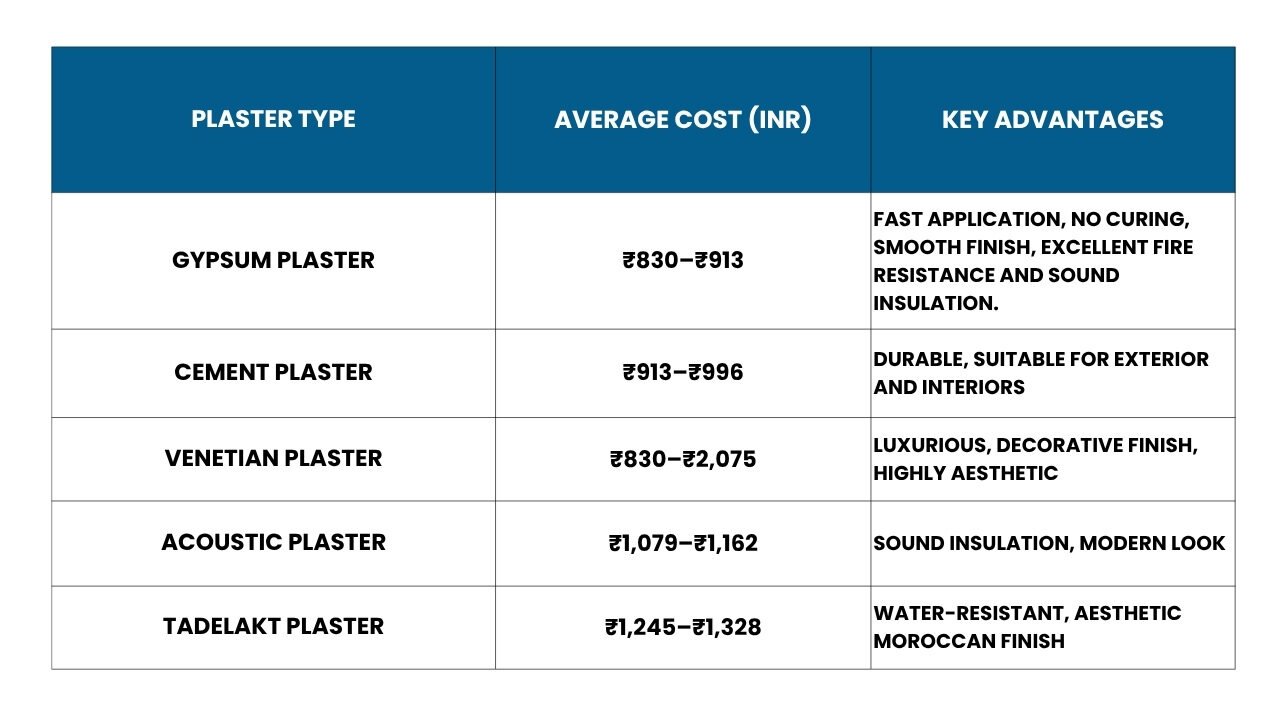
Conclusion
Based on the efficient estimating of the project’s costs, accurate costing and efficient planning can be achieved through a proper rate analysis of the gypsum plaster. Clients and contractors can control costs related to unexpected expenses and provide competitively priced, quality work through an understanding of material, labour, and other indirect expense breakdowns. Effective planning for construction budgets hinges on understanding rate analysis for gypsum plaster, but keep in mind that no two projects are alike. At Gemplast, we tailor our cost estimates based on site conditions, quantity requirements, and application methods.
FAQ
1. What does a rate analysis for gypsum plaster include?
It includes the material gypsum plaster, water, additives, plastering labour, plastering tools, overhead cost, and profit infused into the cost by the contractor. The charge for the plaster’s rate analysis covers one square meter without considering the plaster’s thickness and the complexity of the work done.
2. What is the required amount of gypsum plaster possible to apply on every square meter?
Spreading plaster 12 mm thick takes around 9 to 11 kg of gypsum plaster for each square. This figure is liable to minor changes due to surface shrinkage or porosity.
3. Is gypsum plaster cheaper than cement plaster?
In terms of raw material pricing, gypsum plaster is more expensive, but it cuts costs on curing, eases labour time, and reduces finishing expenses. The overall costs are sometimes competitive and, at other times, lower than the total construction time and finish criteria.
4. What are the labour rates in gypsum plastering cost analysis?
The plasterer’s cost is between ₹40 and ₹70 per square meter of work done. This, however, depends on the area, size of the project, complexity of the work, and level of the available workforce. It covers all verbal agreements with skilled masons and helpers for the surface cleaning and plastering sessions.
5. Are curing processes needed by water for gypsum plaster?
No. This does not apply to water; hence, minimal labour is required, which saves time. This feature gives cement plaster an advantage.
